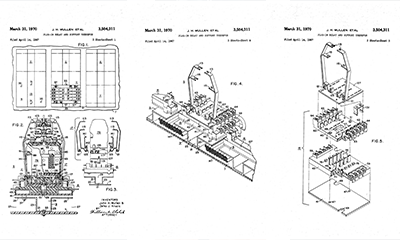
Donner Tech v Pro Stage Gear
Donner Technology, LLC V. Pro Stage Gear, LLC
No. 2020-1104 Appeal from the United States Patent and Trademark Office, Patent Trial and Appeal Board in No. IPR2018- 00708. Fed. Cir. November 9, 2020 Before Chief Judge Prost, with Circuit Judges Dyk and Hughes.
Donner Technology, LLC (“Donner”) petitioned for inter partes review (“IPR”) challenging various claims as obvious under 35 U.S.C. § 103. Donner’s petition set forth three grounds of unpatentability relying on the teachings of U.S. Patent No. 3,504,311 (“Mullen”). The Patent Trial and Appeal Board (“Board”) rejected these challenges on the ground that Donner did not prove that Mullen is analogous art. The Court vacated the Board’s decision and remanded the case.
Guitar effects pedals are electronic devices usually placed on a pedalboard and controlled by foot operation switches. The Pro Stage Gear patent purported to yield an improved pedal effects board that allowed easy positioning and changing of individual guitar effects, while providing a confined and secure area for cable routing and placement.
Mullen related to electrical relays. Mullen stated that one “object of this invention is to provide an improved support for supporting one or more relay structures and for providing wiring-channel space for receiving wires that would be connected to the relay structures to connect the relay structures in various control circuits.”
The Court applied the test for analogous art found in In re Bigio, 381 F.3d 1320, 1325 (Fed. Cir. 2004): “Two separate tests define the scope of analogous prior art: (1) whether the art is from the same field of endeavor, regardless of the problem addressed and, (2) if the reference is not within the field of the inventor’s endeavor, whether the reference still is reasonably pertinent to the particular problem with which the inventor is involved.” Finding no dispute that the patent and Mullen are not from the same field of endeavor, the Court stated that issue before it was “whether Mullen is reasonably pertinent to one or more of the particular problems” to which the patent related. The Court went on to state that the dividing line between reasonable pertinence and less-than-reasonable pertinence “ultimately rests on the extent to which the reference of interest and the claimed invention relate to a similar problem or purpose.”
The Court found that the Board erroneously stated that Donner did not provide evidence or argument to explain what would have compelled a pedalboard inventor in 1999 or 2000 to consider potential solutions arising from early 1970s-era relay technologies. The Court also determined that the “Board also failed to properly identify and compare the purposes or problems” to which Mullen and the patent related. The Court indicated that “problems to which the claimed invention and reference at issue relate must be identified and compared from the perspective of a person having ordinary skill in the art (“PHOSITA”),” which the Board failed to do. According to the opinion, it is not necessary that a PHOSITA understand the entirety of a reference; it is only necessary for the PHOSITA to understand the relevant teachings sufficiently well to use those teachings to solve the problem.
While finding that Mullen was reasonably pertinent to one or more of the problems to which the patent pertains, the Court declined to entirely dispose of the case. The Court refused to hold that no reasonable fact finder could conclude that Mullen is not analogous art, and remanded the case for the Board to resolve this factual issue.
Read more: Federal Bar member attorneys may access the full case summary by registered patent attorney B.C. “Bill” Killough in the Nov/Dec 2020 issue of Federal Circuit Case Digest.
 B.C. Killough is a registered patent attorney based in Charleston, SC. On behalf of his clients, Bill has obtained more than 300 United States patents, participated in prosecuting more than 100 foreign patent applications and he has filed more than 1000 trademark applications with the US Patent and Trademark Offices.
B.C. Killough is a registered patent attorney based in Charleston, SC. On behalf of his clients, Bill has obtained more than 300 United States patents, participated in prosecuting more than 100 foreign patent applications and he has filed more than 1000 trademark applications with the US Patent and Trademark Offices.
Additionally, you may read the full opinion here.